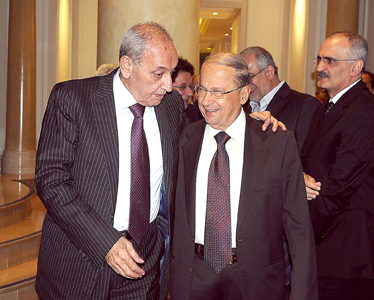 According to a report by Lebanese daily al-Akhbar a trip to Moscow by Finance Minister Ali Hassan Khalil preceded the Ain al-Tinah agreement between Speaker Nabih Berri and Free Patriotic Movement chief Gebran Bassil regarding the issue of offshore oil and gas exploration.
According to a report by Lebanese daily al-Akhbar a trip to Moscow by Finance Minister Ali Hassan Khalil preceded the Ain al-Tinah agreement between Speaker Nabih Berri and Free Patriotic Movement chief Gebran Bassil regarding the issue of offshore oil and gas exploration.
“The Berri-Bassil agreement was preceded by an understanding between Finance Minister Ali Hassan Khalil and Russian officials during the minister’s recent visit to Moscow,” the daily which is closely allied with March 8 alliance reported.
Khalil is a close aide of Berri and a key member of his AMAL Movement.
“The agreement with the Russians involved Moscow’s commitment to extract oil and gas from the three southern blocks of Lebanon’s Exclusive Economic Zone, which neighbors Israel’s oil and gas blocks,” al-Akhbar said.
“Moscow also committed itself to addressing any crises that might be stirred by the (Israeli) enemy,” the daily added.
According to the newspaper, the Berri-Bassil agreement was preceded by reports suggesting that the Lebanese disputes over oil and gas exploration were linked to “a disagreement over the nationalities of the companies that would be tasked with offshore excavation.”
Al-Akhbar claimed that Khalil’s deal in Moscow was preceded by an American deal with the Russians
“This domestic agreement on oil and gas exploration was the result of a prior Russian-American deal on splitting shares,” Al-Akhbar added.
The Kuwaiti al-Anbaa newspaper reported Sunday that the executive decrees for offshore oil and gas exploration would be issued within two weeks.
Russia has been active in carving for itself a role in the exploration of the Mediterranean oil and gas fields
Last April Israeli media reported that Russia’s President Vladimir Putin has offered to invest in Israel’s natural gas development.
“Putin very much wants Russia to be the major developer of energy fields in the Mediterranean, and the first target has been Israel.”Jewish.Press.com website reported on April 7, 2016
According to the report “Putin has pledged Russian influence to block attacks by Iranian proxies against any Russian-operated field. Efforts by Hezbollah to stop Israel from developing its natural resources beneath the Mediterranean would likely be among the targets of Russian ire”, the report added ,
Russia has already started exploring the Syrian offshore gas and oil fields too and also offered the Syrian regime protection against Israel
Several Lebanese ministers sounded suspicious over the deal reached between the Free Patriotic Movement and the Amal Movement over the country’s oil and gas reserves.
In an interview with the Lebanese daily As-Safir published Monday, Labor Minister Seja’an Qazzi said that the country’s oil and gas reserves were not the property of any political faction, adding that he will oppose any “bilateral deals” during the upcoming Cabinet discussions.
“The oil wealth does not belong to any side…the way the agreement was announced suggests that they are saying the oil is ours.” he said.
Culture Minister Raymond Araiji who represents the Marada Movement in the cabinet had this to say about the deal :
“Right now, we are dealing with a strategic issue, which can’t tolerate any sugarcoating. It needs professionalism, expertise, responsibility and transparency.”
Telecommunications Minister Boutros Harab said he was surprised over the absence of Energy and Water Minister Arthur Nazarian during the Amal/FPM discussions.
Israel started exploration several years ago and so has has Cyprus and even Syria with the help of Russia , in spite of its conflict according to the report
Israel will also soon start exporting gas to Turkey according to a report by the Turkish daily Harriyet
Lebanon and Israel are also still bickering over Exclusive Economic Zone that consists of about 854 square kilometers and projected energy reserves that could generate billions of dollars.
Lebanon argues that a maritime map it submitted to the U.N. is in line with an armistice accord drawn up in 1949, an agreement which is not contested by Israel.
In March 2010, the U.S. Geological Survey estimated a mean of 1.7 billion barrels of recoverable oil and a mean of 34.5 trillion cubic meters of recoverable gas in the Levant Basin in the eastern Mediterranean, which includes the territorial waters of Lebanon, Israel, Syria and Cyprus.
According to oil and gas experts “Lebanon badly needs the oil and gas revenue because of its huge public debt but the Lebanese politicians could not be trusted to deal with this sophisticated issue in a transparent manner . Most of the money could end end up in the pockets of the politicians like everything else the experts are saying . The Lebanese politicians were incapable of resolving a basic issue like the garbage and even there everyone of these politicians was looking for his own share . It is much better for the future Lebanese generations if the oil and gas resources remain underground until such a time when decent politicians start running the country. This FPM , Amal deal stinks like the garbage deal “

Leave a Reply
You must be logged in to post a comment.